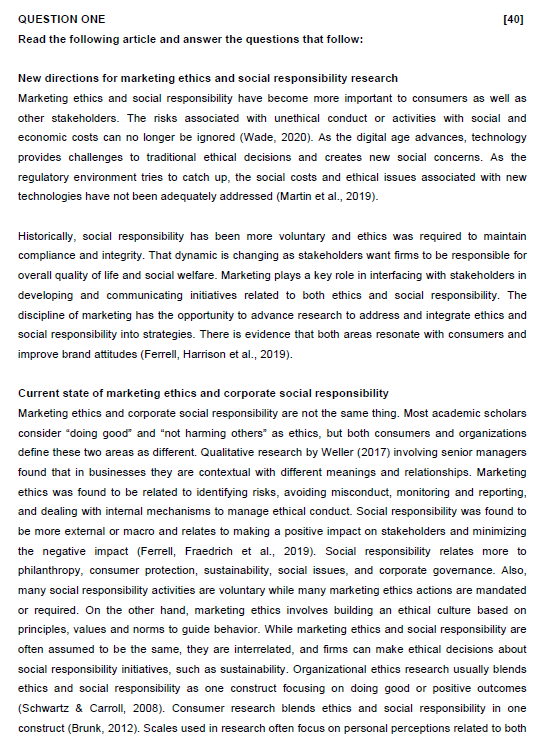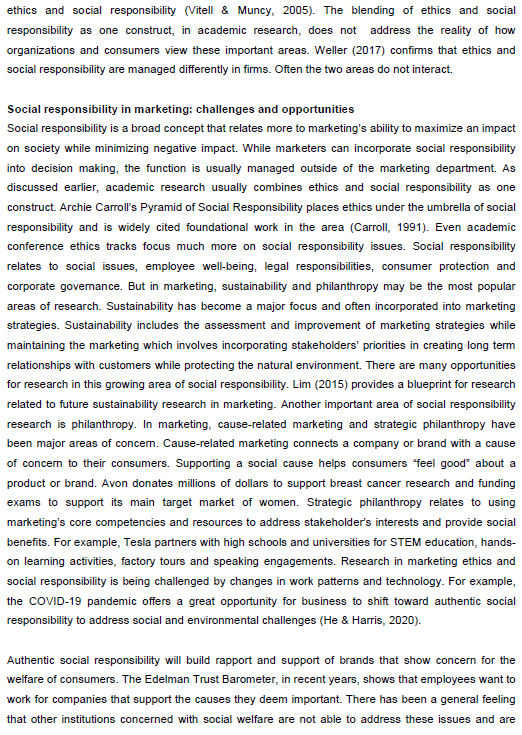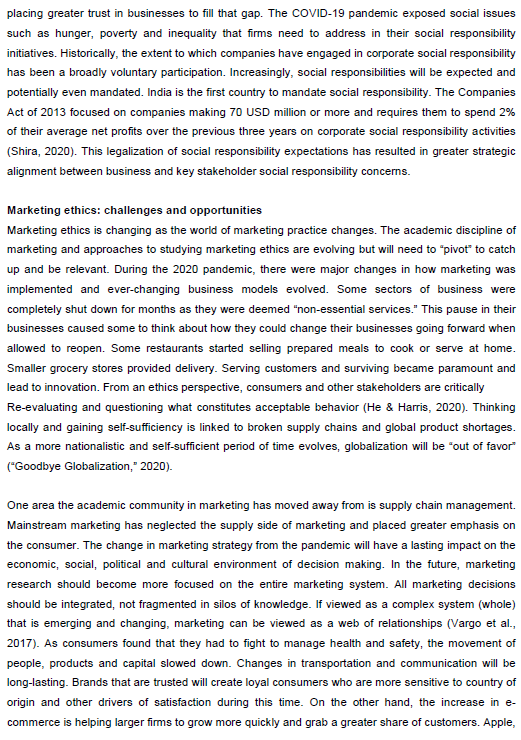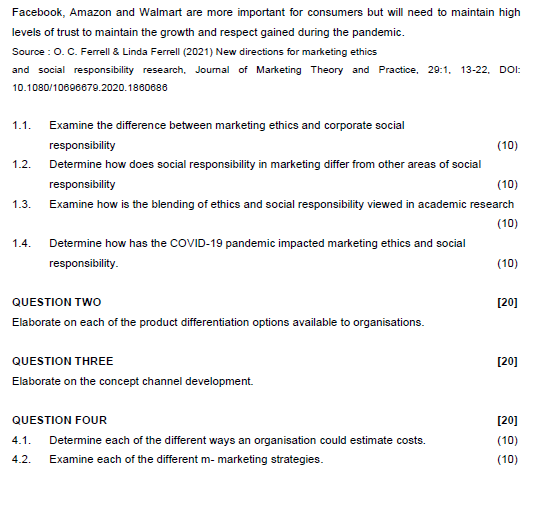Answered step by step
Verified Expert Solution
Question
1 Approved Answer
QUESTION ONE [40] Read the following article and answer the questions that follow: New directions for marketing ethics and social responsibility research Marketing ethics and



 QUESTION ONE [40] Read the following article and answer the questions that follow: New directions for marketing ethics and social responsibility research Marketing ethics and social responsibility have become more important to consumers as well as other stakeholders. The risks associated with unethical conduct or activities with social and economic costs can no longer be ignored (Wade, 2020). As the digital age advances, technology provides challenges to traditional ethical decisions and creates new social concerns. As the regulatory environment tries to catch up, the social costs and ethical issues associated with new technologies have not been adequately addressed (Martin et al., 2019). Historically, social responsibility has been more voluntary and ethics was required to maintain compliance and integrity. That dynamic is changing as stakeholders want firms to be responsible for overall quality of life and social welfare. Marketing plays a key role in interfacing with stakeholders in developing and communicating initiatives related to both ethics and social responsibility. The discipline of marketing has the opportunity to advance research to address and integrate ethics and social responsibility into strategies. There is evidence that both areas resonate with consumers and improve brand attitudes (Ferrell, Harrison et al., 2019). Current state of marketing ethics and corporate social responsibility Marketing ethics and corporate social responsibility are not the same thing. Most academic scholars consider "doing good" and "not harming others" as ethics, but both consumers and organizations define these two areas as different. Qualitative research by Weller (2017) involving senior managers found that in businesses they are contextual with different meanings and relationships. Marketing ethics was found to be related to identifying risks, avoiding misconduct, monitoring and reporting, and dealing with internal mechanisms to manage ethical conduct. Social responsibility was found to be more external or macro and relates to making a positive impact on stakeholders and minimizing the negative impact (Ferrell, Fraedrich et al., 2019). Social responsibility relates more to philanthropy, consumer protection, sustainability, social issues, and corporate governance. Also, many social responsibility activities are voluntary while many marketing ethics actions are mandated or required. On the other hand, marketing ethics involves building an ethical culture based on principles, values and norms to guide behavior. While marketing ethics and social responsibility are often assumed to be the same, they are interrelated, and firms can make ethical decisions about social responsibility initiatives, such as sustainability. Organizational ethics research usually blends ethics and social responsibility as one construct focusing on doing good or positive outcomes (Schwartz \& Carroll, 2008). Consumer research blends ethics and social responsibility in one construct (Brunk, 2012). Scales used in research often focus on personal perceptions related to both ethics and social responsibility (Vitell \& Muncy, 2005). The blending of ethics and social responsibility as one construct, in academic research, does not address the reality of how organizations and consumers view these important areas. Weller (2017) confirms that ethics and social responsibility are managed differently in firms. Often the two areas do not interact. Social responsibility in marketing: challenges and opportunities Social responsibility is a broad concept that relates more to marketing's ability to maximize an impact on society while minimizing negative impact. While marketers can incorporate social responsibility into decision making, the function is usually managed outside of the marketing department. As discussed earlier, academic research usually combines ethics and social responsibility as one construct. Archie Carroll's Pyramid of Social Responsibility places ethics under the umbrella of social responsibility and is widely cited foundational work in the area (Carroll, 1991). Even academic conference ethics tracks focus much more on social responsibility issues. Social responsibility relates to social issues, employee well-being, legal responsibilities, consumer protection and corporate govemance. But in marketing, sustainability and philanthropy may be the most popular areas of research. Sustainability has become a major focus and often incorporated into marketing strategies. Sustainability includes the assessment and improvement of marketing strategies while maintaining the marketing which involves incorporating stakeholders' priorities in creating long term relationships with customers while protecting the natural environment. There are many opportunities for research in this growing area of social responsibility. Lim (2015) provides a blueprint for research related to future sustainability research in marketing. Another important area of social responsibility research is philanthropy. In marketing, cause-related marketing and strategic philanthropy have been major areas of concern. Cause-related marketing connects a company or brand with a cause of concern to their consumers. Supporting a social cause helps consumers "feel good" about a product or brand. Avon donates millions of dollars to support breast cancer research and funding exams to support its main target market of women. Strategic philanthropy relates to using marketing's core competencies and resources to address stakeholder's interests and provide social benefits. For example, Tesla partners with high schools and universities for STEM education, handson learning activities, factory tours and speaking engagements. Research in marketing ethics and social responsibility is being challenged by changes in work patterns and technology. For example, the COVID-19 pandemic offers a great opportunity for business to shift toward authentic social responsibility to address social and environmental challenges (He \& Harris, 2020). Authentic social responsibility will build rapport and support of brands that show concern for the welfare of consumers. The Edelman Trust Barometer, in recent years, shows that employees want to work for companies that support the causes they deem important. There has been a general feeling that other institutions concerned with social welfare are not able to address these issues and are placing greater trust in businesses to fill that gap. The COVID-19 pandemic exposed social issues such as hunger, poverty and inequality that firms need to address in their social responsibility initiatives. Historically, the extent to which companies have engaged in corporate social responsibility has been a broadly voluntary participation. Increasingly, social responsibilities will be expected and potentially even mandated. India is the first country to mandate social responsibility. The Companies Act of 2013 focused on companies making 70 USD million or more and requires them to spend 2% of their average net profits over the previous three years on corporate social responsibility activities (Shira, 2020). This legalization of social responsibility expectations has resulted in greater strategic alignment between business and key stakeholder social responsibility concerns. Marketing ethics: challenges and opportunities Marketing ethics is changing as the world of marketing practice changes. The academic discipline of marketing and approaches to studying marketing ethics are evolving but will need to "pivot" to catch up and be relevant. During the 2020 pandemic, there were major changes in how marketing was implemented and ever-changing business models evolved. Some sectors of business were completely shut down for months as they were deemed "non-essential services." This pause in their businesses caused some to think about how they could change their businesses going forward when allowed to reopen. Some restaurants started selling prepared meals to cook or serve at home. Smaller grocery stores provided delivery. Serving customers and surviving became paramount and lead to innovation. From an ethics perspective, consumers and other stakeholders are critically Re-evaluating and questioning what constitutes acceptable behavior (He \& Harris, 2020). Thinking locally and gaining self-sufficiency is linked to broken supply chains and global product shortages. As a more nationalistic and self-sufficient period of time evolves, globalization will be "out of favor" ("Goodbye Globalization," 2020). One area the academic community in marketing has moved away from is supply chain management. Mainstream marketing has neglected the supply side of marketing and placed greater emphasis on the consumer. The change in marketing strategy from the pandemic will have a lasting impact on the economic, social, political and cultural environment of decision making. In the future, marketing research should become more focused on the entire marketing system. All marketing decisions should be integrated, not fragmented in silos of knowledge. If viewed as a complex system (whole) that is emerging and changing, marketing can be viewed as a web of relationships (Vargo et al., 2017). As consumers found that they had to fight to manage health and safety, the movement of people, products and capital slowed down. Changes in transportation and communication will be long-lasting. Brands that are trusted will create loyal consumers who are more sensitive to country of origin and other drivers of satisfaction during this time. On the other hand, the increase in ecommerce is helping larger firms to grow more quickly and grab a greater share of customers. Apple, Facebook, Amazon and Walmart are more important for consumers but will need to maintain high levels of trust to maintain the growth and respect gained during the pandemic. Source : O. C. Ferrell \& Linda Ferrell (2021) New directions for marketing ethics and social responsibility research, Journal of Marketing Theory and Practice, 29:1, 13-22, DOI: 10.1080/10696679.2020.1860686 1.1. Examine the difference between marketing ethics and corporate social responsibility (10) 1.2. Determine how does social responsibility in marketing differ from other areas of social responsibility 1.3. Examine how is the blending of ethics and social responsibility viewed in academic research 1.4. Determine how has the COVID-19 pandemic impacted marketing ethics and social responsibility. QUESTION TWO [20] Elaborate on each of the product differentiation options available to organisations. QUESTION THREE [20] Elaborate on the concept channel development. QUESTION FOUR [20] 4.1. Determine each of the different ways an organisation could estimate costs. (10) 4.2. Examine each of the different m - marketing strategies
QUESTION ONE [40] Read the following article and answer the questions that follow: New directions for marketing ethics and social responsibility research Marketing ethics and social responsibility have become more important to consumers as well as other stakeholders. The risks associated with unethical conduct or activities with social and economic costs can no longer be ignored (Wade, 2020). As the digital age advances, technology provides challenges to traditional ethical decisions and creates new social concerns. As the regulatory environment tries to catch up, the social costs and ethical issues associated with new technologies have not been adequately addressed (Martin et al., 2019). Historically, social responsibility has been more voluntary and ethics was required to maintain compliance and integrity. That dynamic is changing as stakeholders want firms to be responsible for overall quality of life and social welfare. Marketing plays a key role in interfacing with stakeholders in developing and communicating initiatives related to both ethics and social responsibility. The discipline of marketing has the opportunity to advance research to address and integrate ethics and social responsibility into strategies. There is evidence that both areas resonate with consumers and improve brand attitudes (Ferrell, Harrison et al., 2019). Current state of marketing ethics and corporate social responsibility Marketing ethics and corporate social responsibility are not the same thing. Most academic scholars consider "doing good" and "not harming others" as ethics, but both consumers and organizations define these two areas as different. Qualitative research by Weller (2017) involving senior managers found that in businesses they are contextual with different meanings and relationships. Marketing ethics was found to be related to identifying risks, avoiding misconduct, monitoring and reporting, and dealing with internal mechanisms to manage ethical conduct. Social responsibility was found to be more external or macro and relates to making a positive impact on stakeholders and minimizing the negative impact (Ferrell, Fraedrich et al., 2019). Social responsibility relates more to philanthropy, consumer protection, sustainability, social issues, and corporate governance. Also, many social responsibility activities are voluntary while many marketing ethics actions are mandated or required. On the other hand, marketing ethics involves building an ethical culture based on principles, values and norms to guide behavior. While marketing ethics and social responsibility are often assumed to be the same, they are interrelated, and firms can make ethical decisions about social responsibility initiatives, such as sustainability. Organizational ethics research usually blends ethics and social responsibility as one construct focusing on doing good or positive outcomes (Schwartz \& Carroll, 2008). Consumer research blends ethics and social responsibility in one construct (Brunk, 2012). Scales used in research often focus on personal perceptions related to both ethics and social responsibility (Vitell \& Muncy, 2005). The blending of ethics and social responsibility as one construct, in academic research, does not address the reality of how organizations and consumers view these important areas. Weller (2017) confirms that ethics and social responsibility are managed differently in firms. Often the two areas do not interact. Social responsibility in marketing: challenges and opportunities Social responsibility is a broad concept that relates more to marketing's ability to maximize an impact on society while minimizing negative impact. While marketers can incorporate social responsibility into decision making, the function is usually managed outside of the marketing department. As discussed earlier, academic research usually combines ethics and social responsibility as one construct. Archie Carroll's Pyramid of Social Responsibility places ethics under the umbrella of social responsibility and is widely cited foundational work in the area (Carroll, 1991). Even academic conference ethics tracks focus much more on social responsibility issues. Social responsibility relates to social issues, employee well-being, legal responsibilities, consumer protection and corporate govemance. But in marketing, sustainability and philanthropy may be the most popular areas of research. Sustainability has become a major focus and often incorporated into marketing strategies. Sustainability includes the assessment and improvement of marketing strategies while maintaining the marketing which involves incorporating stakeholders' priorities in creating long term relationships with customers while protecting the natural environment. There are many opportunities for research in this growing area of social responsibility. Lim (2015) provides a blueprint for research related to future sustainability research in marketing. Another important area of social responsibility research is philanthropy. In marketing, cause-related marketing and strategic philanthropy have been major areas of concern. Cause-related marketing connects a company or brand with a cause of concern to their consumers. Supporting a social cause helps consumers "feel good" about a product or brand. Avon donates millions of dollars to support breast cancer research and funding exams to support its main target market of women. Strategic philanthropy relates to using marketing's core competencies and resources to address stakeholder's interests and provide social benefits. For example, Tesla partners with high schools and universities for STEM education, handson learning activities, factory tours and speaking engagements. Research in marketing ethics and social responsibility is being challenged by changes in work patterns and technology. For example, the COVID-19 pandemic offers a great opportunity for business to shift toward authentic social responsibility to address social and environmental challenges (He \& Harris, 2020). Authentic social responsibility will build rapport and support of brands that show concern for the welfare of consumers. The Edelman Trust Barometer, in recent years, shows that employees want to work for companies that support the causes they deem important. There has been a general feeling that other institutions concerned with social welfare are not able to address these issues and are placing greater trust in businesses to fill that gap. The COVID-19 pandemic exposed social issues such as hunger, poverty and inequality that firms need to address in their social responsibility initiatives. Historically, the extent to which companies have engaged in corporate social responsibility has been a broadly voluntary participation. Increasingly, social responsibilities will be expected and potentially even mandated. India is the first country to mandate social responsibility. The Companies Act of 2013 focused on companies making 70 USD million or more and requires them to spend 2% of their average net profits over the previous three years on corporate social responsibility activities (Shira, 2020). This legalization of social responsibility expectations has resulted in greater strategic alignment between business and key stakeholder social responsibility concerns. Marketing ethics: challenges and opportunities Marketing ethics is changing as the world of marketing practice changes. The academic discipline of marketing and approaches to studying marketing ethics are evolving but will need to "pivot" to catch up and be relevant. During the 2020 pandemic, there were major changes in how marketing was implemented and ever-changing business models evolved. Some sectors of business were completely shut down for months as they were deemed "non-essential services." This pause in their businesses caused some to think about how they could change their businesses going forward when allowed to reopen. Some restaurants started selling prepared meals to cook or serve at home. Smaller grocery stores provided delivery. Serving customers and surviving became paramount and lead to innovation. From an ethics perspective, consumers and other stakeholders are critically Re-evaluating and questioning what constitutes acceptable behavior (He \& Harris, 2020). Thinking locally and gaining self-sufficiency is linked to broken supply chains and global product shortages. As a more nationalistic and self-sufficient period of time evolves, globalization will be "out of favor" ("Goodbye Globalization," 2020). One area the academic community in marketing has moved away from is supply chain management. Mainstream marketing has neglected the supply side of marketing and placed greater emphasis on the consumer. The change in marketing strategy from the pandemic will have a lasting impact on the economic, social, political and cultural environment of decision making. In the future, marketing research should become more focused on the entire marketing system. All marketing decisions should be integrated, not fragmented in silos of knowledge. If viewed as a complex system (whole) that is emerging and changing, marketing can be viewed as a web of relationships (Vargo et al., 2017). As consumers found that they had to fight to manage health and safety, the movement of people, products and capital slowed down. Changes in transportation and communication will be long-lasting. Brands that are trusted will create loyal consumers who are more sensitive to country of origin and other drivers of satisfaction during this time. On the other hand, the increase in ecommerce is helping larger firms to grow more quickly and grab a greater share of customers. Apple, Facebook, Amazon and Walmart are more important for consumers but will need to maintain high levels of trust to maintain the growth and respect gained during the pandemic. Source : O. C. Ferrell \& Linda Ferrell (2021) New directions for marketing ethics and social responsibility research, Journal of Marketing Theory and Practice, 29:1, 13-22, DOI: 10.1080/10696679.2020.1860686 1.1. Examine the difference between marketing ethics and corporate social responsibility (10) 1.2. Determine how does social responsibility in marketing differ from other areas of social responsibility 1.3. Examine how is the blending of ethics and social responsibility viewed in academic research 1.4. Determine how has the COVID-19 pandemic impacted marketing ethics and social responsibility. QUESTION TWO [20] Elaborate on each of the product differentiation options available to organisations. QUESTION THREE [20] Elaborate on the concept channel development. QUESTION FOUR [20] 4.1. Determine each of the different ways an organisation could estimate costs. (10) 4.2. Examine each of the different m - marketing strategies Step by Step Solution
There are 3 Steps involved in it
Step: 1

Get Instant Access to Expert-Tailored Solutions
See step-by-step solutions with expert insights and AI powered tools for academic success
Step: 2

Step: 3

Ace Your Homework with AI
Get the answers you need in no time with our AI-driven, step-by-step assistance
Get Started


